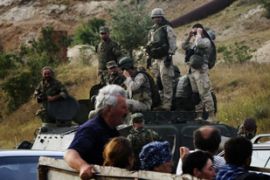Fears grow of humanitarian crisis
UN urges both sides to halt lawlessness as international pressure on Russia mounts.

In a statement, Farhan Haq, Ban’s spokesman, said: “The secretary-general welcomes the ceasefire agreement reached by the governments of Georgia and the Russian Federation, but notes that notwithstanding this agreement, there are reports of some continuing violence, with civilians bearing the brunt.
“He reminds all parties concerned of their obligation to respect and protect civilians in accordance with international humanitarian law and human rights law.
“All fighting should end immediately and the current state of lawlessness should cease. Moreover, as tensions continue to run high, it is essential that measures be taken to ensure the protection of minority groups throughout Georgia.”
Looting
In the key Georgian town of Gori, west of the capital Tbilisi, journalists saw signs of looting which locals blamed on militias from the neighbouring province of South Ossetia, where the conflict erupted a week ago.
| In depth | ||
|
Timeline: Countdown to conflict |
Russian armed forces have occupied parts of Georgia since repelling a Georgian attack last week on the tiny pro-Russian separatist territory of South Ossetia, which threw off Tbilisi’s control in the 1990s.
Shops had been smashed up in Gori and there were very few parked cars.
The Russians had pledged to stop looting but men wearing an assortment of camouflaged uniforms stole cars from journalists and from the UN on Thursday and a hidden sniper shot at a female Georgian television correspondent, grazing her arm.
Angela Merkel, the German chancellor, is to meet Dmitry Medvedev, the Russian president, on Friday to urge Moscow to embrace diplomacy in its showdown with Georgia to avoid a serious rift with the West.
But that rift appeared to be widening as Russia’s neighbour Ukraine announced it would enforce a presidential decree demanding that warships from Russia’s Black Sea fleet based at a Ukrainian port get advance permission before putting to sea or returning.
That decision drew an angry response from Moscow, with the Russian General Staff dismissing it as “illegitimate” and insisting the Russian fleet would only obey orders from its commander-in-chief in the Kremlin.
EU monitors
Meanwhile, members of Europe’s security and rights organisation, the OSCE, appeared ready to send up to 100 more monitors to Georgia to help supervise the fragile ceasefire.
“We have discussed this proposal in the permanent council and there is no decision yet, but I can say that there is no objection in principle on this… The decision will be taken as soon as possible,” Heikki Talvitie, the OSCE’s special envoy for the South Caucasus, said.
Russia, Georgia and the US are all OSCE members.
The OSCE currently has a mission of about 200 people in Georgia, of whom eight are military monitoring officers looking at security, military and humanitarian issues in and around the conflict zone.
Turkish aid
Turkey increased humanitarian assistance for Georgia on Thursday, sending 10 trucks carrying relief supplies to its northeastern neighbour.
The shipments contained food, kitchen kits and clothes, a Red Crescent official said in the northern city of Trabzon, from where the aid was sent.
Recep Tayyip Erdogan, the Turkish prime minister, met Mikheil Saakashvili, the Georgian president, in Tbilisi early on Thursday, and promised that Turkish assistance for Georgia would continue.
Turkey has developed close ties with Georgia since its neighbour gained independence following the collapse of the Soviet Union, and supports its bid to join Nato.
The US also continued to send humanitarian relief, with a second C-17 US military cargo aircraft arriving in Tbilisi, on Thursday morning.
But the Russian General Staff’s deputy chief, Colonel-General Anatoly Nogovitsyn, criticised the US airlift and insinuated that it was more than humanitarian supplies.
“We have information that American military-transport aviation say they are delivering a certain humanitarian cargo to Tbilisi airport, though they said we had bombed the airport two days ago,” he said.
“Let’s ask them: Will they invite you [the media] to check whether it is humanitarian or not?… What is in it in reality? It is of major concern to Russians.”
Despite the concerns over the humanitarian fallout, Russian troops and armour have continued to be deployed around Georgian towns.
Georgian officials accused Russia of sending a column of tanks and other armoured vehicles toward Kutaisi, then said the convoy stopped about 56km from Georgia’s second-largest city.
The US said a move toward Kutaisi would be a matter of great concern, but two defence officials said the Pentagon had not detected any major movement by Russia troops or tanks.
Russian troops also continued to hold the key central Georgian town of Gori and the Georgian Black Sea port of Poti.
The Russian General Staff said it was legitimate for “Russian peacekeepers” to be in Poti and for what it termed reconnaissance parties to be in Gori, two days after Russia signed up to a French-led peace plan to stop the fighting.
